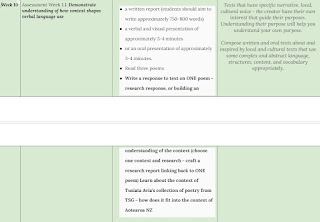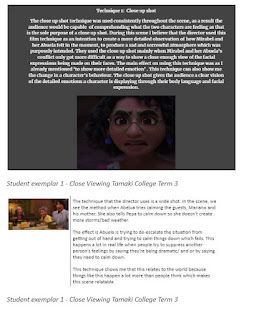Traditionally in our current year planner and program for our NCEA Level 1, 2 and 3 course outline, the assessment drives the learning. This time around, we are putting the learning at the forefront and allowing the assessment to fall out of the rich learning. I have reflected on our journey through the new curriculum here:
In November 2022, we looked at this standard. To understand and get familiar with the standard we focused on the following areas:
The focus for Term 2 is 'Their Stories and Their Histories: Window' looking into the stories and experiences of people in our country. The primary text for Term 2 is the New Zealand film 'The Dark Horse'. The learning intention is understanding certain aspects of texts and why it is used to create meaning. The assessment that we are going to bring in to support the learning is 1.2. Here I am going outline the assessment and what we hope to do with it.
1.2Demonstrate understanding of specific aspects of studied texts
- What is the assessment?
- What are the key words/concepts of the assessment?
- What are the opportunities with this assessment?
- What are the potential barriers for kaiako with this assessment?
- What are our next steps?
- Unpacking the three activities provided by NCEA
By breaking it down, we were able to get our head around the standard. Please refer to the post - Alby's Blog Entry Post - 24/08/22 - to see how this went for our department. Since then I have taken learning from this conversation and the learning from design of our NCEA Level 1 Course and started a unit plan. My plan is centered around three areas, I will explain each area and what I have done with them.
PART ONE: Learning Intention
The learning intention of this unit is:
TERM 2: Our stories + Our history (windows)
In this unit we will learn about our stories and our histories by focusing on the film ‘The Dark Horse’.
We’ll learn about how language and literature are unique taonga that give us insights into ourselves and others in Glen Innes, and we’ll practice using our voices to tell our own stories. We’ll end with an assessment where we show off what we’ve learned about our understanding specific parts of a text and how it works to create meaning.
PART TWO: Defining the three key areas of focus
- Focus: This simply outlines what the focus is for the week or time period. It is clear for both kaiako and akonga what they will be looking at.
- Action: The action is the 'learning'. Here I have outlined what they will be doing with the focus area and it explains the formative assessments that we could cover.
- Learning Goal (linking to the Significant Learning and UDK - Understand, Know and Do - from Te Mataiaho: The Refreshed New Zealand Curriculum): Linking the focus and action to the significant learning and UDK is integral, as it helps to narrow the learning priority for each phase of the unit. Another step that I would like to start experimenting with is to rewrite the UKD and significant learning so that it is more directly relevant to the unit. This is something that I would like to do especially when we start to roll out each unit for both assessments.
Much like our plan for Term 1, our Term 2 plan will follow the same format. We will spend week 1 - 7 focusing on our primary text (The Dark Horse film). We will then look at certain aspects of the text that have been used well and that create rich meaning and learning. We will bring in the assessment from week 8 and this will run into week 2 of Term 3.
PART THREE: Bringing the learning and assessment together
Although our program is mostly brand new (especially our program for Term 1). There are some things that we are currently doing that we want to keep and integrate into our course outline.
The learning intention for week 8 - week 10 (assessment week) that we have taken from Te Mataiaho is:
Compose written and oral texts about and inspired by local and cultural texts that use some complex and abstract language, structures, content, and vocabulary appropriately.
We want the students to compose and craft a response to the text either through:
- Close Viewing
- Response to text essay
- Vlog entry
For a close viewing assessment (for example) we will do a close viewing/reading of specific scenes from the text and then for the actual close viewing assessment, we will assess the students on a scene not studied in class but they can draw on the learning from our formative assessment to craft their responses.
NEXT STEPS:
- Finalise our assessment for 1.2 with the Department this term.









